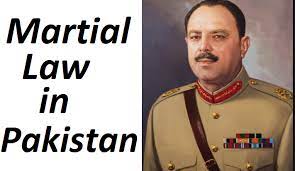“Unraveling The Chaos: General Ayoub Khan And Martial Law of 1958
The Hidden Forces that Led to Martial Law in Pakistan

a. Introduction:
General Ayub Khan, a prominent military figure, played a significant role in Pakistan’s history. He came to power in 1958 through a military coup and declared martial law, which marked a critical turning point in the country’s political landscape. The introduction of martial law under Ayub Khan’s leadership had several underlying causes, which are detailed below.
b. Causes of the Introduction of Martial Law under General Ayub Khan:
- Political Instability
- Economic Challenges
- Decaying Civilian Institutions
- Role of the Military
- Desire for Modernization
- National Reconciliation
1. Political Instability:
Pakistan experienced a series of political crises and frequent changes in leadership after gaining independence in 1947. The unstable political climate was marked by ineffective governance, infighting among political parties, and corruption.
2. Economic Challenges:
The country faced severe economic challenges, including inflation, unemployment, and a lack of economic development. The existing political leadership seemed incapable of addressing these issues effectively.
3. Decaying Civilian Institutions:
The civilian institutions in Pakistan, including the bureaucracy and judiciary, were plagued by inefficiency and corruption. This weakened the overall governance structure and further eroded public trust in the civilian administration.
4. Role of the Military:
The military, under General Ayub Khan, saw itself as a stabilizing force in Pakistan and believed it was better equipped to address the country’s challenges. The military’s involvement in politics gained momentum as a result of these perceived weaknesses in civilian leadership.
5. Desire for Modernization:
General Ayub Khan, and many within the military, believed that modernization and development were essential for Pakistan’s progress. They saw themselves as agents of change and considered martial law as a means to expedite the modernization process.
6. National Reconciliation:
Ayub Khan justified the imposition of martial law by claiming it was necessary to bring about national reconciliation. He aimed to unite the diverse regions and ethnic groups within Pakistan and establish a strong central government.
Conclusion:
The introduction of martial law under General Ayub Khan in Pakistan was driven by a combination of factors, including political instability, economic challenges, decaying civilian institutions, the military’s perception of itself as a stabilizing force, the desire for modernization, and the pursuit of national reconciliation. General Ayub Khan’s coup aimed to address these issues and provide stability, but it also marked a shift towards military dominance in the country’s political landscape.
FAQ’s:
- What is martial law, and why was it imposed in Pakistan under General Ayub Khan?
- How did political instability contribute to the imposition of martial law?
- What role did economic challenges play in the decision to declare martial law?
- How did the decay of civilian institutions affect the political climate in Pakistan?
- Why did General Ayub Khan and the military see themselves as better suited to lead the country?
- What were the goals of modernization under General Ayub Khan’s leadership?
- How did the imposition of martial law impact the democratic process in Pakistan?
- Did the introduction of martial law under General Ayub Khan achieve its intended goals of stability and development?
2 comments